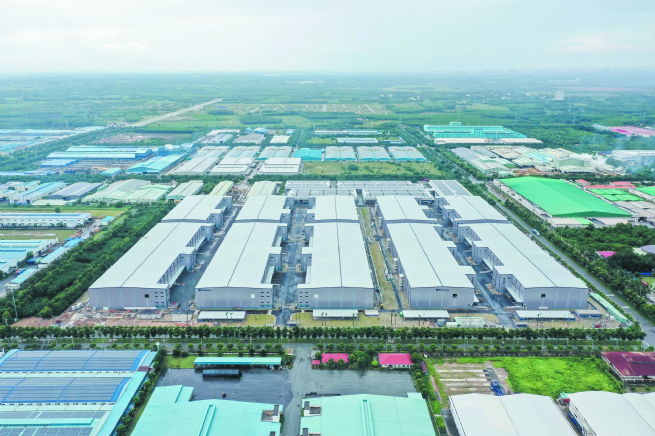2:00:27 PM | 4/29/2025
Dong Nai has advantageous geographical location, natural resources, regional transport infrastructure and abundant labor resources. Industrial parks with complete and high-quality infrastructure have created an attractive force for FDI firms and helped turn Dong Nai into an industrial leader.

Nhon Trach 2 - Loc Khang Industrial Park is an appealing destination for businesses
According to the Dong Nai Provincial Planning approved by the Prime Minister in Decision 586/QD-TTg dated July 3, 2024, the province will have 48 industrial parks (IPs) with a total planned area of 18,443 ha by 2030. To date, 37 IPs have been established with a total land area of 13,107.59 ha (including 335-ha Bien Hoa I Industrial Park), including 31 IPs in operation and one under construction (Long Thanh High-Tech Park). Especially, all operational IPs have standard wastewater treatment systems. Dong Nai-based IPs have leased 6,082.41 ha of land, or 86.13% of the rentable area (7,033.08 ha), excluding five newly established IPs), and attracted a total of 2,163 projects from 45 countries and territories, including 1,516 foreign-invested projects with US$31.33 billion, of which US$23.55 billion was disbursed, and 647 domestic projects with VND86,344.83 billion, meeting business needs of licensed companies. FDI funds reached or exceeded US$1 billion a year in recent years.
Tenants in Dong Nai-based IPs are engaged in various industries in line with the province's investment policy, including service, supporting industries, machinery and equipment manufacturing. With huge financial power, the FDI sector has developed many new manufacturing industries and created significant changes in technology and governance. Many tenants in IPs have worked effectively, helped improve local economic competitiveness and created jobs for workers. Currently, more than 592,700 workers are working in IPs, including 584,227 Vietnamese workers. Most of them have vocational qualifications, including 19% with intermediate degrees, 50.6% are trained workers (including in-house training provided by tenants) and 30.4% are untrained workers.
According to the Provincial Planning for the 2021-2030 period, with a vision to 2050, Dong Nai advocates selectively attracting FDI capital and calling for environmentally friendly modern high-tech projects. Accordingly, the Dong Nai Industrial Zones Authority (DIZA) has closely coordinated with relevant bodies to effectively implement planning and attract investment projects in IPs, focusing on developing clean, high-tech industries. The authority has resolutely turned down projects that cause pollution, employ a lot of labor and use outdated technologies such as tanning, dyeing and electroplating, and prioritized environmentally friendly high-tech projects, supporting industries and small projects that generate high added value, generate strong ripple effects, connect global production and supply chains. It has required tenants to provide a roadmap for science and technology transfer.
DIZA has also regularly reviewed and prepared premises, land, infrastructure, labor and energy to entice redirected investment flows and reposition production; and supported and urged infrastructure investors to promptly complete planned IP infrastructure. The authority has upgraded synchronous infrastructure (electricity, water, transport infrastructure, telecommunications and logistics) to create competitive advantages to woo long-term investment; actively reformed administrative procedures in a simple and rapid manner, enhanced the sense of responsibility to businesses, helped them save costs and operate more effectively; provided more electronic public administrative services for investors; and regularly organized periodic business meetings and recorded their comments to have prompt, active solutions.
At the same time, DIZA has reinforced foreign investment promotion, proactively approached large domestic and foreign corporations with modern advanced technology and huge investment funds; paid attention to luring small and medium investors of supporting industries, clean capital-intensive technology; and actively and effectively implemented commitments in bilateral and multilateral trade and investment agreements such as WTO and EVFTA.
In addition, the authority asked relevant authorities to study and consider making and applying appropriate investment incentive policies, based on investment fields rather than investment locations as at present, and introduce proper incentive policies on social security and worker housing for projects. It will continue to research and propose developing new IPs to achieve higher economic, environmental and social efficiency such as industry-linked IPs, supporting IPs and eco-IPs.
Nguyen Bach (Vietnam Business Forum)